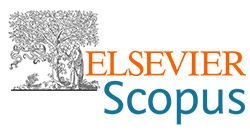Inhibitivni efekat magnetnog polja na koroziju mekog čelika u kiselom mediju
DOI:
https://doi.org/10.5937/zasmat2301030OApstrakt
Inhibitivni efekat primenjenih magnetnih polja na koroziju mekog čelika u 1.0 M HCl i 0.5 M H2SO4 kiselinskim rastvorima ispitan je na sobnoj temperaturi gravimetrijskom tehnikom. Lokalno napravljen elektromagnet sa promenljivim izlazima i napajan iz izvora jednosmerne struje obezbeđivao je magnetna polja. U tipičnom eksperimentu, korišćeno magnetno polje je primenjeno okomito na površinu kupona od mekog čelika koji je u potpunosti uronjen u izabrani rastvor kiseline tokom vremena izlaganja od dva sata. Uočeno je da se brzine korozije mekog čelika određene za svaki slučaj testnih rastvora od 1.0 M HCl i 0.5 M H2SO4 smanjuju kako se primenjeno magnetno polje povećava. Ovo ukazuje da prisustvo primenjenog magnetnog polja inhibira koroziju mekog čelika u ispitivanim rastvorima. Rezultati, takođe, pokazuju da se efikasnost zaštite magnetnog polja povećava kako se primenjeno magnetno polje povećava. ačnije, kako je magnetno polje povećano sa 118,2 - 764,3 mG [ili 0,01182 - 0,07643 mT], efikasnost zaštite je porasla sa 36,34 - 62,67% za meki čelik u 1.0 M rastvoru HCl kiseline, dok je za meki čelik u kiselini 0.5M H2SO4 efikasnost zaštite povećana sa 12,68 - 46,88%. Pokazano je da se uočeni inhibicijski efekat magnetnih polja može delom pripisati fenomenu poprečne magnetootpornosti, a delom uticaju magnetnih polja na svojstva transporta mase konstitutivnih jona u elektrohemijskom sistemu.Ključne reči:
meki čelik, magnetno polje, gravimetrijska tehnika, brzina korozije, efikasnost zaštite, magnetootpornostReference
Aaboubi, O., Chopart, J.P., Douglade, J.D., Olivier, A., Gabrielli, C., Tribollet, B. (1990) Magnetic field effects on mass transport.Journal of The Electrochemical Society, 137(6): 1796-1804
https://doi.org/10.1149/1.2086807
Andreas, B., Adriana, I., Gerd, M. (2008) Magnetic field effects on electrochemical metal deposition.Sci. Technol. Advan. Mater, 9: 24208-24208
Animalu, A.O.E. (1977) Intermediate quantum theory of crystalline solids. New Jersey: Prentice -Hall Inc
Anosike, G.C. (2012) Investigation of the effect of some local plant extracts and magnetic field on the corrosion of aluminium alloy AA3003 in hydrochloric acid solutions. Owerri, Nigeria: Federal University of Technology, Final Year Undergraduate Project Report presented to Department of Physics; June; Unpublished
Ashcroft, N.W., Mermin, N.D. (1976) Solid state physics. Tokyo: Holt -Saunders Japan, book
Callister, W.D. (2003) Materials science and engineering: An introduction. New York: John Wiley & Sons
Chiba, A., Tanaka, N., Ueno, S., Ogawa, T. (1992) Study on the electrochemical corrosion behaviour of NdFe-B sintered magnets in different remanence state.Corros. Engineer, 41: 333-337
Chiba, A., Kawazu, K., Nakano, O., Tamura, T., Yoshihara, S., Sato, E. (1994) The effects of magnetic fields on the corrosion of aluminum foil in sodium chloride solutions.Corrosion Science, 36(3): 539-546
https://doi.org/10.1016/0010-938X(94)90042-6
Costa, I., Oliveira, M.C.L., de Melo, H.G., Faria, R.N. (2004) The effect of the magnetic field on the corrosion behavior of Nd-Fe-B permanent magnets.Journal of Magnetism and Magnetic Materials, 278(3): 348-358
https://doi.org/10.1016/j.jmmm.2003.12.1320
Duru, M.O. (2017) The effect of Alchornea cordifolia leaf extract and magnetic field on the corrosion of Ti6Al4V exposed to simulated body fluids. Owerrri, Nigeria: Federal University of Technology, Master of Science Degree Thesis; June; Unpublished
Hryniewicz, T., Rokosz, K., Rokicki, R. (2008) Electrochemical and XPS studies of AISI 316L stainless steel after electropolishing in a magnetic field.Corrosion Science, 50(9): 2676-2681
https://doi.org/10.1016/j.corsci.2008.06.048
Hu, J.C., Dong, C., Li, X., Xiao, K. (2010) Effects of applied magnetic field on corrosion of beryllium copper in NaCl solution.Journal of Materials Science & Technology, 26(4): 355-361
https://doi.org/10.1016/S1005-0302(10)60058-8
Kelly, E.J. (1977) Magnetic field effects on electrochemical reactions at metal/flowing electrolyte interface.Journal of The Electrochemical Society, 124(7): 987-994
https://doi.org/10.1149/1.2133514
Kittel, C. (1963) Quantum theory of solids. New York: John Wiley & Sons, book
Lee, J., Ragsdale, S.R., Gao, X., White, H.S. (1997) Magnetic field control of the potential distribution and current at microdisk electrodes.Journal of Electroanalytical Chemistry, 422(1-2): 169-177
https://doi.org/10.1016/S0022-0728(96)04878-4
Lu, Z., Huang, D., Yang, W., Congleton, J. (2003) Effects of an applied magnetic field on the dissolution and passivation of iron in sulphuric acid.Corrosion Science, 45(10): 2233-2249
https://doi.org/10.1016/S0010-938X(03)00045-3
Maayta, A.K., Fares, M.M., Al-Shawabkeh, A.F. (2010) Influence of linear aikyl benzene sulphonate on corrosion of iron in presence of magnetic field: Kinetic and thermodynamic parameters.International Journal of Corrosion, Article ID 156194
https://doi.org/10.1155/2010/156194
Maayta, A.K., Al-Rawashdeh, N.A. (2010) The inhibiting effect of alkyl benzene sulphonate and magnetic field on aluminium corrosion in acidic solution.Jordan J. Chem, 5(2): 175-189
https://doi.org/10.1155/2010/156194
Maurice, M.I., Bierechi, O.K., Agoh, U., Chukwuebuka, I.D., Tamadu, O.J. (2022) The protective effect of magnetic fields on the corrosion of aluminium alloys in hydrochloric acid solutions.Zaštita materijala, vol. 63, br. 3, str. 271-279
https://doi.org/10.5937/zasmat2203271M
Mejeha, I.M., Nwandu, M.C., Okeoma, K.B., Nnanna, L.A., Chidiebere, M.A., Eze, F.C., Oguzie, E.E. (2012) Experimental and theoretical assessment of the inhibiting action of Aspilia africana extract on corrosion aluminium alloy AA3003 in hydrochloric acid.Journal of Materials Science, 47(6): 2559-2572
https://doi.org/10.1007/s10853-011-6079-2
Nnanna, L.A., Onwuagba, B.N., Mejeha, I.M., Okeoma, K.B. (2010) Inhibiting effects of some plant extracts on acid corrosion of aluminium alloy.Afri. J. Pure Appl. Chem, 4(1): 11-16
Novinski, V.C. (1997) Magnetic field effect on copper electrodeposition in the Tafel potential region.Electrochimica Acta, 42(2): 251-254
https://doi.org/10.1016/0013-4686(96)00151-X
Okeoma, K.B., Mejeha, I.M., Akajiaku, S.C., Eze, F.C., Orji, C.E. (2016) Investigative Studies of on the inhibitive effects of Newbouldia laevis extracts and magnetic fields on copper corrosion in aqueous acidic media.Inter. J. Engineer. Sci, 6(2): 5-14
Onuchukwu, A.I. (2008) Electrochemical technology. Ibadan: Spectrum Books Limited
Ručinskien≐, A., Bikulčius, G., Gudavičiūt≐, L., Juzeliūnas, E. (2002) Magnetic field effect on stainless steel corrosion in FeCl3 solution.Electrochemistry Communications, 4(1): 86-91
https://doi.org/10.1016/S1388-2481(01)00280-6
Sabeva, E.K., Dobrevski, I.D. (2003) Effect of magnetic field on the dissolution of aluminium electrodes.Ciencia & Technogia Materials, 15: 32-34
Samir, L., Nasher, H., Buraq, L.A., Shalash, T. (2004) Study of the effect of magnetic field on the corrosion of steel in sodium chloride solution (NaCl).Misan J. Academic Studies, 9(17): 30-37
Shinohara, K., Aogaki, R. (1999) Magnetic field effect on copper corrosion in nitric acid.Electrochemistry, 67(2): 126-131
https://doi.org/10.5796/electrochemistry.67.126
Sueptitz, R., Koza, J., Uhlemann, M., Gebert, A., Schultz, L.A. (2009) Magnetic field effect on the anodic behaviour of a ferromagnetic electrode in acidic solutions.Electrochimica Acta, 54(8): 2229-2233
https://doi.org/10.1016/j.electacta.2008.10.055
Tacken, R.A., Janssen, L.J.J. (1995) Applications of magnetoelectrolysis.Journal of Applied Electrochemistry, 25(1): 1-5
https://doi.org/10.1007/BF00251257
Tang, Y.C., Gonzalez-Torreira, M., Yang, S., Davenport, A.J. (2003) Effect of magnetic field on corrosion.J. Corros. Sci. Engineer, 6: 110-122
##submission.downloads##
Objavljeno
Broj časopisa
Rubrika
Licenca
Sva prava zadržana (c) 2023 CC BY 4.0 by Authors

Ovaj rad je pod Creative Commons Autorstvo 4.0 Internacionalna licenca.






